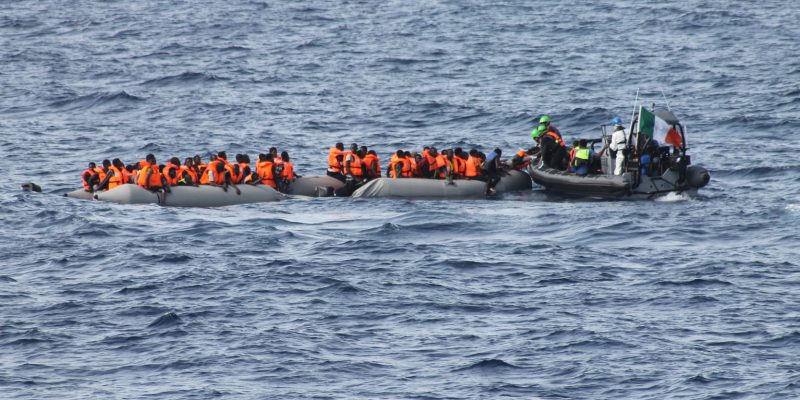1. Those migrants at sea that nobody wants
According to European law, coastal nations who rescue refugees at sea must allow them to claim asylum on land. This creates perverse incentives for states to leave people adrift, in a deadly “humanitarian ping-pong” between different jurisdictions. Read Christina Psarra’s article for Refugees Deeply.
2. Mediterranean death rate doubles as migrant crossings fall
Meanwhile, the number of migrants crossing the Mediterranean has dropped (from over 200,000 in May 2016 to just over 70,000 in May 2017), yet the mortality rate has almost doubled (with a record number of deaths). Read Mark Townsend’s article for the Guardian.
3. Debunking myths about why people migrate across the Mediterranean
Our discussions of migrants at sea are often grounded in misplaced assumptions that are disproved by data. These include the myth of “destination Europe” and the effectiveness of deterrence policies. Vicki Squire’s article in The Conversation tries to debunk some of these myths about forced migration.
4. The EU’s push to prevent boats leaving could fuel horrific abuses, report finds
The EU is willing to do anything to stop refugee boat crossings across the Mediterranean sea – even to disregard international law and human rights by forcing thousands of refugees back to “hell on earth”, that is, Libya. Read Lizzie Dearden’s article for the Independent.
5. What’s behind the attacks on aid workers at sea
The accusations against humanitarian NGOs who are saving thousands of lives out at sea are an attempt to deflect public attention from the EU’s responsibilities in the management of the humanitarian crisis and the failure of its counter-smuggling efforts. Read Jenna Belhumeur’s article for Al Jazeera.
6. Humanitarian NGOs, from “angels of the sea” to “taxi cabs for migrants”
There has been a change in the narratives about migrations across the Mediterranean and particularly about humanitarian missions at sea: a study by Osservatorio di Pavia, Associazione Carta di Roma and Cospe tracks the shifting media coverage of NGO rescue operations, from “angels of the sea” to “taxi cabs for migrants”. Read Luca Liverani’s article in Avvenire and Ansa’s piece in InfoMigrants.
7. The complex story of Polish refugees in Iran
Thousands of Poles sought shelter in Iran during World War II, but today Poland has slammed the door on refugees. This report in Al Jazeera tells the two sides of a complex story.
8. Why we need to talk more about the internally displaced
The focus on refugees is overshadowing the issue of internally displaced people, who are forced to leave their homes but remain within the borders of their country. Their numbers are rising, but they are still waiting for the world to take notice of their plight. Read Faras Ghani’s article for Al Jazeera.
9. A map to understand 15 years of migrations
If we look at the global refugee flow between 2000 and 2015, our “European refugee emergency” is hardly visible: a map from the Carnegie Mellon University Pittsburgh puts everything in perspective, allowing us to overcome our emotional preconceptions of a non-existing “invasion”. Read the articles in FastCompany and The Submarine.
10. Meet our new neighbours
The “refugee crisis” seen through the eyes of the many young people who reached Europe after a desperate journey. Teenagers forced to run from wars and persecutions find themselves in a foreign continent and try to build a new life. A new special project by Vice in a partnership with the UNHCR explains how, with original content from the guest editors ranging from “A playlist of songs I listened to while trying to get from Syria to Europe” to “How to be fashionable on a budget”.
Translation by Francesco Graziosi.
HEADER PHOTO: Irish Defence Forces (CC BY-NC 2.0).









